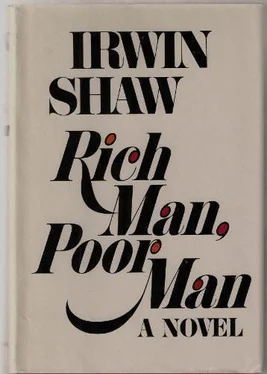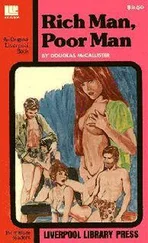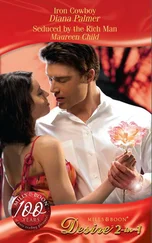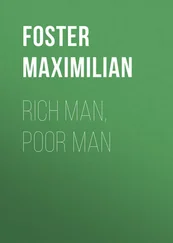The bar of the Port Philip House was empty except for two soldiers who were moodily staring at glasses of wartime beer near the entrance. The bar was dark and cool and they could look out through the windows at the station, its lights now on in the dusk. They sat at a table near the back and when the bartender came over to them, wiping his hands on his apron, Gretchen said, firmly, Two Black and White and soda, please.’
The barman didn’t ask whether or not they were over eighteen. Gretchen had ordered as if she had been drinking whiskey in bars all her life.
Actually, Rudolph would have preferred a coke. The afternoon had been too full of occasions.
Gretchen poked at his cheek with two fingers. ‘Don’t look so glum,’ she said. ‘It’s your birthday.’
‘Yeah,’ he said.
‘Why did Pa send Tommy away?’
‘I don’t know. Neither of them would tell me. Something happened with the Tinkers. Tommy hit Pa. I know that.’
‘Wooh…’ Gretchen said softly. ‘Quite a day, isn’t it?’
‘It sure is,’ Rudolph said. It was a bigger day than she realised, he thought, remembering what Tom had told him earlier about her. The barman came over with their drinks and a siphon bottle. ‘Not too much soda, please,’ Gretchen said.
The barman splashed some soda in Gretchen’s glass. ‘How about you?’ He held the siphon over Rudolph’s glass.
‘The same,’ Rudolph said, acting eighteen.
Gretchen raised her glass. To that well-known ornament to
Port Philip society,’ she said, ‘the Jordache family.’
They drank. Rudolph had not yet developed a taste for Scotch. Gretchen drank thirstily, as though she wanted to finish the first one fast, so that there would be time for another one before the train came in.
‘What a family.’ She shook her head. The famous Jordache collection of authentic mummies. Why don’t you get on the train with me and come and live in New York?’
‘You know I can’t do that,’ he said.
‘I thought I couldn’t do it, too,’ she said. ‘And I’m doing it.’
‘Why?’
‘Why what?’
‘Why’re you going? What happened?’
‘A lot of things,’ she said vaguely. She took a long swig of her whiskey. ‘A man mostly.’ She looked at him defiantly. ‘A man wants to marry me.’
‘Who? Boylan?’
Her eyes dilated, grew darker in the dim saloon. ‘How do you know?’
Tommy told me.’
‘How does he know?’
Well, why not, he thought. She asked for it. Jealousy and shame for her made him want to hurt her. ‘He went up to the hill and looked in through a window.’
‘What did he see?’ she asked coldly.
‘Boylan. Naked.’
“He didn’t get much of a show, poor Tommy.’ She laughed; The laugh was metallic. ‘He’s not much to look at, Teddy Boylan. Did he have the good luck to see me naked, too?’
‘No.’
Too bad,’ she said. ‘It would have made his trip worthwhile.’ There was something hard and self-wounding in his sister that Rudolph had never seen in her before. ‘How did he know I was there?’
‘Boylan called upstairs to ask you if you wanted to have
your drink there.’
‘Oh,’ she said. “That night That was a big night. Some time I’ll tell you about it’ She studied his face. ‘Don’t look so
stormy. Sisters have a habit of growing up and going out with fellas.’
‘But Boylan,’ he said bitterly. That puny old man,’
“He’s not that old,’ she said. ‘And not that puny.’
‘You liked him,’ he said accusingly.
‘I liked it,’ she said. Her face became very sober. ‘I liked it better than anything that ever happened to me.’
Then why’re you running away?’
‘Because if I stay here long enough, I’ll wind up marrying Mm. And Teddy Boylan’s not fit for your pure, beautiful little sister to marry. It’s complicated, isn’t it? Is your life complicated, too? Is there some dark, sinful passion you’re nursing in your bosom, too? An older woman you visit while her husband’s at the office, a . . ?’
‘Don’t make fun of me,’ he said.
‘Sorry.’ She touched his hand, then gestured towards the bartender. When he came over, she said, ‘One more, please.’ As the bartender went back to fill the order, she said, ‘Ma was drunk when I left. She finished all your birthday wine. The blood of the lamb. That’s all that family needs - ‘ She spoke as though they were discussing the idiosyncrasies of strangers. ‘A drunken crazy old lady. She called me a harlot,’ Gretchen chucked. ‘A last loving farewell to the girl going to the big city. Get out,’ she said harshly, ‘get out before they finish crippling you. Get out of that house where nobody has a friend, where the doorbell never rings.’
‘I’m not crippled,’ he said.
‘You’re frozen in an act, Brother.’ The hostility was out in the open now. ‘You don’t fool me. Everybody’s darling, and you don’t give a good goddamn if the whole world lives or dies. If that’s not being crippled, put me in a wheelchair any day.’
The bartender came over and put her drink down in front of her and half filled the glass with soda.
‘What the hell,’ Rudolph said, standing up. ‘If that’s what you think of me, there’s no sense in my hanging around any more. You don’t need me.’
‘No, I don’t,’ she said.
‘Here’s the ticket for your bag.’ He handed her the slip of paper.
‘Thanks,’ she said woodenly. ‘You’ve done your good deed for the day. And I’ve done mine.’
He left her sitting there in the bar, drinking her second whiskey, her lovely, oval face flushed at the cheek bones, her eyes shining, her wide mouth avid, beautiful, hungry, bitter, already a thousand miles removed from the dingy apartment above the bakery, removed from her father and mother, her brothers, her lover, on her way to a city that engulfed a million girls a year.
He walked slowly towards home, tears for himself in his eyes. They were right, they were right about him, his brother, his
sister; their judgements on him were just. He had to change. How do you change, what do you change? Your genes, your chromosomes, your sign of the zodiac?
As he neared Vanderhoff Street, he stopped. He couldn’t bear the thought of going home yet. He didn’t want to see his mother drunk, he didn’t want to see that stunned, hating look, like a disease, in his father’s eyes. He walked on down towards the river. There was a faint afterglow from the sunset and the river slid by like wet steel, with a smell like a deep, cool cellar in chalky ground. He sat on the rotting wharf near the warehouse in which his father kept his shell and looked out towards the opposite shore.
Far out, he could see something moving. It was his father’s shell, the oars going in a fierce, even rhythm, biting the water, going upstream.
He remembered that his father had killed two men, one with a knife, one with a bayonet.
He felt empty and beaten. The whiskey he had drunk burned in his chest and there was a sour taste in his mouth.
I’ll remember this birthday, he thought.
Mary Pease Jordache sat in the living room, in darkness and in the fumes of smoke from the roast goose. She was oblivious to them and to the vinegary aroma of the cabbage that lay cold on the disordered platter. Two of them gone, she thought, the thug and the harlot I have Rudolph alone now, she exulted drunkenly. If only a storm came up and swamped the shell, far, far out on the cold river, what a day it would be.
A horn blew outside the garage and Tom climbed out from under the Ford on which he was working in the grease pit, and wiping his hands on a rag, went out to where the Oldsmobile was standing next to one of the pumps.
Читать дальше











